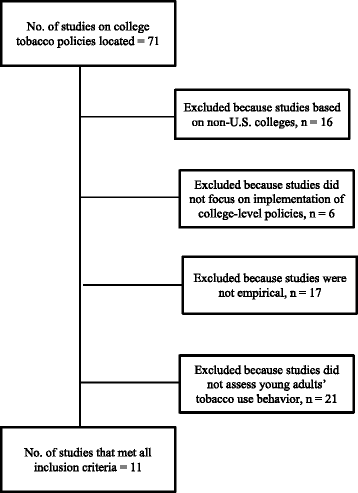College anti-smoking policies and student smoking behavior: a review of the literature
- PMID: 28163669
- PMCID: PMC5286782
- DOI: 10.1186/s12971-017-0117-z
College anti-smoking policies and student smoking behavior: a review of the literature
Abstract
Background: Currently, most college campuses across the U.S. in some way address on-campus cigarette smoking, mainly through policies that restrict smoking on campus premises. However, it is not well understood whether college-level anti-smoking policies help reduce cigarette smoking among students. In addition, little is known about policies that may have an impact on student smoking behavior. This study attempted to address these issues through a literature review.
Methods: A systematic literature review was performed. To identify relevant studies, the following online databases were searched using specific keywords: Ovid MEDLINE, PsycINFO, PubMed, and Google Scholar. Studies that met the exclusion and inclusion criteria were selected for review. Studies were not excluded based on the type of anti-smoking policy studied.
Results: Total 11 studies were included in the review. The majority of the studies (54.5%) were cross-sectional in design, 18% were longitudinal, and the rest involved counting cigarette butts or smokers. Most studies represented more women than men and more Whites than individuals of other ethnic/racial groups. The majority (54.5%) of the studies evaluated 100% smoke-free or tobacco-free campus policies. Other types of policies studied included the use of partial smoking restriction and integration of preventive education and/or smoking cessation programs into college-level policies. As far as the role of campus smoking policies on reducing student smoking behavior is concerned, the results of the cross-sectional studies were mixed. However, the results of the two longitudinal studies reviewed were promising in that policies were found to significantly reduce smoking behavior and pro-smoking attitudes over time.
Conclusion: More longitudinal studies are needed to better understand the role of college anti-smoking policies on student smoking behavior. Current data indicate that stricter, more comprehensive policies, and policies that incorporate prevention and cessation programming, produce better results in terms of reducing smoking behavior.
Keywords: Cigarette smoking; College; Policies; Young adults.
Figures
Similar articles
-
What are the effects of smoke-free and tobacco-free university campus policies, and how can they be assessed? A systematic review.J Epidemiol Popul Health. 2024 Apr;72(2):202520. doi: 10.1016/j.jeph.2024.202520. Epub 2024 Apr 4. J Epidemiol Popul Health. 2024. PMID: 38579395
-
Cigarette butts near building entrances: what is the impact of smoke-free college campus policies?Tob Control. 2013 Mar;22(2):107-12. doi: 10.1136/tobaccocontrol-2011-050152. Epub 2011 Dec 1. Tob Control. 2013. PMID: 22135167
-
E-Cigarette Policies on College Campuses: Student Use Behaviors, Awareness, and Policy Support.J Community Health. 2016 Dec;41(6):1110-1115. doi: 10.1007/s10900-016-0262-y. J Community Health. 2016. PMID: 27655585
-
A review of interventions to reduce tobacco use in colleges and universities.Am J Prev Med. 2005 Feb;28(2):188-200. doi: 10.1016/j.amepre.2004.10.015. Am J Prev Med. 2005. PMID: 15710275 Review.
-
Cigarettes vs. E-Cigarettes: Policy Implications from a Focus Group Study.Subst Use Misuse. 2019;54(12):2082-2087. doi: 10.1080/10826084.2019.1626436. Epub 2019 Jun 13. Subst Use Misuse. 2019. PMID: 31190599
Cited by
-
Change in Compliance of Staff at 4 Vietnam Universities after the Enactment of Smoke-free Environment Decree.Environ Health Insights. 2020 Dec 6;14:1178630220972957. doi: 10.1177/1178630220972957. eCollection 2020. Environ Health Insights. 2020. PMID: 33335398 Free PMC article.
-
Passive exposure and perceptions of smoke-free policies in hospital and university campuses among nursing students: A cross-sectional multicenter study.Tob Induc Dis. 2023 Jul 17;21:93. doi: 10.18332/tid/167390. eCollection 2023. Tob Induc Dis. 2023. PMID: 37465255 Free PMC article.
-
Social Acceptability and Health Concerns of Smoking and Vaping Among University Students: A Cross-Sectional Study.Tob Use Insights. 2024 Nov 11;17:1179173X241300992. doi: 10.1177/1179173X241300992. eCollection 2024. Tob Use Insights. 2024. PMID: 39534376 Free PMC article.
-
Campus tobacco control policies and cessation interventions in college students: a commentary calling for research and action to address tobacco-related health disparities.Transl Behav Med. 2021 Apr 26;11(4):1030-1036. doi: 10.1093/tbm/ibaa083. Transl Behav Med. 2021. PMID: 32893870 Free PMC article.
-
Validation of a Questionnaire to Assess Smoking Habits, Attitudes, Knowledge, and Needs among University Students: A Pilot Study among Obstetrics Students.Int J Environ Res Public Health. 2021 Nov 12;18(22):11873. doi: 10.3390/ijerph182211873. Int J Environ Res Public Health. 2021. PMID: 34831630 Free PMC article.
References
-
- U.S. Department of Health and Human Services . Preventing tobacco use among youth and young adults: a report of the surgeon general. Atlanta: U.S. Department of Health and Human Services, Centers for Disease Control and Prevention, Coordinating Center for Health Promotion, National Center for Chronic Disease Prevention and Health Promotion, Office on Smoking and Health; 2012.
-
- Centers for Disease Control and Prevention (CDC). Smoking and tobacco use. 2016. http://www.cdc.gov/tobacco/data_statistics/. Accessed 16 Aug 2016.
Publication types
Grants and funding
LinkOut - more resources
Full Text Sources
Other Literature Sources
Research Materials
Miscellaneous


